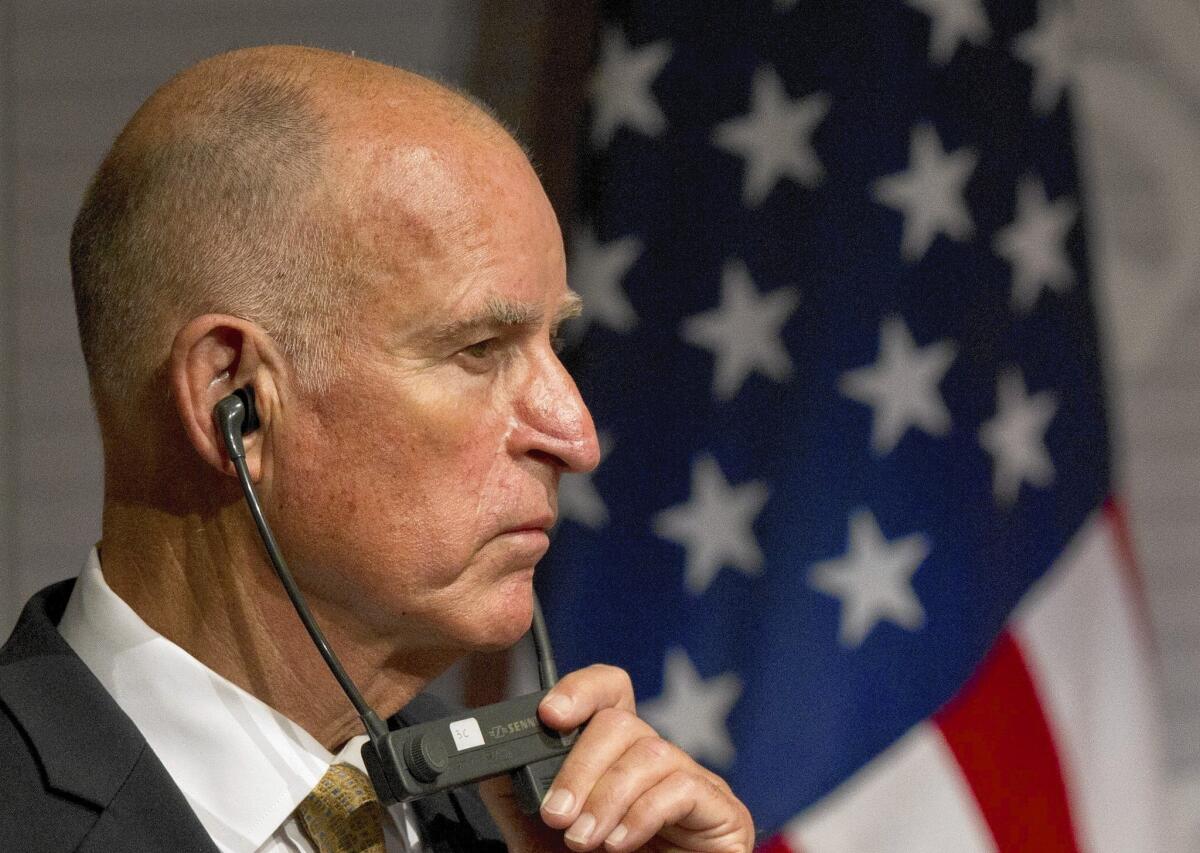Brown, Mexican officials sign climate pact during governor’s trip

When federal leaders in Washington needed new ideas for slashing vehicle pollution, they looked west to California, which had already enacted tighter standards.
Now Gov. Jerry Brown said he hopes Mexico takes the same approach to combating climate change, looking north across the border to adopt some of his state’s policies and technology.
“California has always played an innovative role,” he told reporters Monday during a news conference at Mexico’s Ministry of Foreign Affairs. “We can continue that role with Mexico.”
During one of the most high-profile events of his four-day trade mission here, Brown signed an agreement with Mexican environmental officials to explore new ways for California to work with its southern neighbor on reducing greenhouse gas emissions.
The memorandum of understanding calls for promoting renewable energy, studying ways to control ozone-eating pollution and sharing information on successful strategies.
It’s similar to deals reached last year by Brown and Chinese officials, and it reinforces the California governor’s desire to remain on the front lines of a global issue.
But, like last year’s agreements, it only lays the groundwork for increased cooperation, and there is no guarantee of new reductions in greenhouse gas emissions.
Brown dismissed those concerns shortly before putting pen to paper during a signing ceremony.
“I know some skeptics will say, ‘what are you really accomplishing?’” he said. “Well, we’re accomplishing quite a lot.”
Brown painted a dark picture of the future if governments don’t begin taking action on climate change soon — droughts, wildfires, political upheaval and mass migrations as people flee devastated environments.
“Can we imagine the future,” he said, “and do something about it in the present?”
With growing fears the world is losing ground in the battle, advocates are excited about any potential progress.
“This partnership [between California and Mexico] can demonstrate a new model for collaboration,” said Nathaniel Keohane of the Environmental Defense Fund, who participated in a panel on the topic Monday afternoon. “It’s just what the world is looking for.”
Mary Nichols, chairwoman of the California Air Resources Board, said setting international, binding controls on greenhouse gases is simply not feasible at this point.
“The idea that we’re going to have one world government that will police us is not happening,” she said. In the meantime, she said, individual countries and states need to set their own targets and form their own partnerships.
California has its own cap-and-trade program, which requires polluters to buy permits in order to emit greenhouse gases. Officials have explored expanding the effort to include other states and countries, but so far only Quebec has signed on.
“The longest journey begins with the first step,” said Frank Wolak, director of Stanford’s Program on Energy and Sustainable Development. “At a minimum, what we should try to do is convince every one of these places that you want to follow us.”
Two major international summits on climate change — in Lima, Peru, in December and Paris next year — have been scheduled in hopes of creating a global framework to tackle the problem.
The U.S. ambassador to Mexico, Earl Anthony Wayne, said California’s efforts could help lead to “inclusive, ambitious and effective” solutions.
“We all need to maintain this momentum,” he said.
Unlike in the United States, there’s little political debate in Mexico that climate change is a problem that needs to be addressed. But there’s uncertainty about the best way to approach the issue, and recent legislation sets only voluntary targets for reducing greenhouse gas emissions.
Mexico lags behind California on clean vehicle standards, and its energy industry has been dominated by a government-owned oil monopoly.
In addition, as a developing country, Mexico is wary of any steps that would limit its economic growth, which has already lagged behind ambitious targets set by political leaders.
During Monday’s panel discussion, participants took pains to emphasize the economic benefits of adopting new technologies and setting stricter standards on pollution.
“There will be tremendous economic benefits that will be derived from being on point with climate change,” said Matt Rodriguez, California’s secretary for environmental protection.
Mexican politicians have taken steps to open the country’s energy market to foreign investment, which could create new opportunities for developing renewable sources like solar and wind.
“We would like to see more business in these technologies,” said Rodolfo Lacy Tamayo, undersecretary at Mexico’s Ministry of Environment and Natural Resources.
For his part, Brown said he would continue working on these issues in the coming years “if the people of California choose to keep me around.” He’s running for re-election in November.
Twitter: @chrismegerian
More to Read
Start your day right
Sign up for Essential California for news, features and recommendations from the L.A. Times and beyond in your inbox six days a week.
You may occasionally receive promotional content from the Los Angeles Times.







